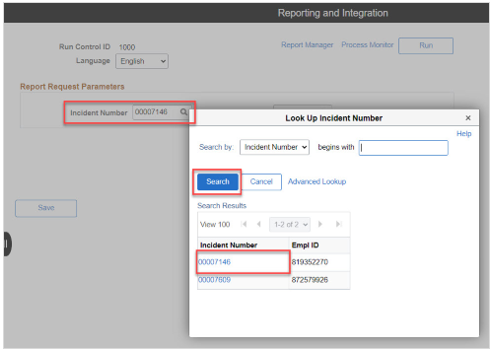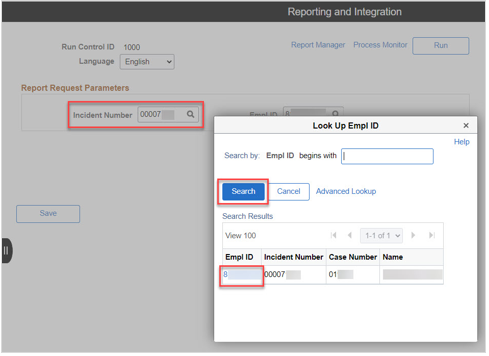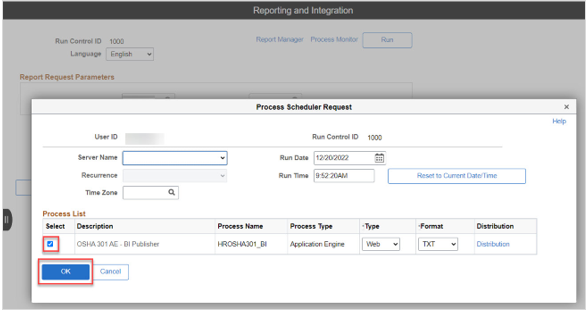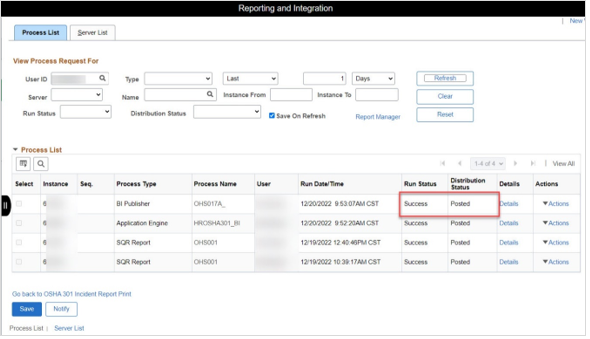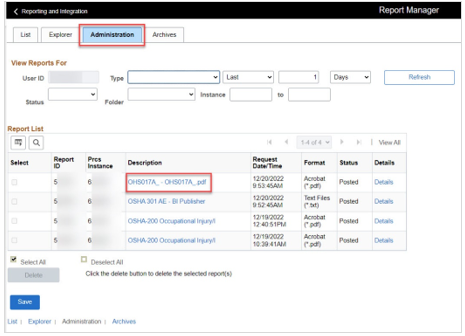Technology
Generate the OSHA 301 Incident Report Print
Last modified 5/23/2023
Learn how to generate the OSHA 301 Incident Report Print.
Before You Begin
To sign in to iPeople, go to hcm.illinoisstate.edu. Once there, click the sign in using CentralLogin button. Then, log in with your ULID and password.
Off Campus Authentication Note
If you are off campus, iPeople will require an MFA request approval. Follow this link to set up your MFA if you still need to. MFA Info/Setup
Requesting Access
OSHA reports can be generated by Environmental Health and Safety (EHS) and Human Resources (HR) superusers.
How to Generate the OSHA 301 Incident Report Print
- On the HCM homepage, select the Reporting and Integration tile.
- This will open the Reporting and Integration page. On the left side of the screen, expand the OSHA Injury/Illness Reporting menu.
- In the OSHA Injury/Illness Reporting menu that appears, select OSHA-200 Log.
- If a new report is being created for the first time, click the Add a New Value tab and enter a new ID in the Run Control ID field. Then, click the Add button. This ID will save the parameters used when it was first created.
If a previously viewed report is being run again, click the Find an Existing Value tab. Enter the Run Control ID in the Run Control ID field. Then, click the Search button. Due to the parameters being saved when the Run Control ID was first created, the same parameters will be used again. - On the next screen, select the type of report to run using the dropdown menu in the Run Report for field. The choices are:
- All Establishments
- Establishments in Company
- HQ & Controlled Establishments
- Incident Number & Empl ID
- Incident Number & Non-Employee
- Single Establishment
For this example, choose Incident Number & Empl ID. Click the Next link. - Enter the Incident Number in the Incident Number field. If unknown, click the lookup button.
In the pop-up window that appears, enter the Incident Number and click the Look Up button. Otherwise, leave the field blank and click the lookup button.A list of Search Results will appear below. Click the appropriate Incident Number. This will close the window and the Incident Number will be written in the Incident Number field.
The Empl ID will be autofilled based on the ID of the employee that reported the incident.
- If the employee has multiple incidents and the Incident Number is unknown, follow this step.
First, enter the Empl ID in the Empl ID field. If unknown, click the lookup button.In the pop-up window that appears, enter the Empl ID and click the lookup button. If unknown, leave the field blank and click the lookup button.
A list of Search Results will appear below. Click the appropriate Empl ID. This will close the window and the Empl ID will be written in the Empl ID field.
Next, click the lookup button next to the Incident Number field. All incidents associated with the employee will appear in a pop-up window. Click on the correct Incident Number. This will close the window and the Incident Number will be written in the Incident Number field.
- Click the Run button.
- In the pop-up window that appears, confirm that the checkbox in the Select column is selected. If it is not selected, click the checkbox.
Click the OK button. This will close the window. - Click the Process Monitor.
- On the Process List tab, click the Refresh button until the Run Status is “Success” and the Distribution Status is “Posted.”
- Next, view the report. First, click the NavBar icon at the upper right of the screen.
- In the dropdown menu that appears below, click the Menu icon.
- Click Reporting Tools.
- The Reporting Tools menu will appear. Click Report Manager.
- On the Report Manager page, click the Administration Then, click the .pdf link in the row containing the report that was run.
- The report will open in a new tab.
Still Need Assistance?
If you are unable to log in or need technical assistance, contact the Technology Support Center (TSC):
Phone: (309) 438-4357
Email: supportcenter@illinoisstate.edu
Website: Help.IllinoisState.edu
See Also:
- Link to Related Article(s)
Feedback
To suggest an update to this article, ISU students, faculty, and staff should submit an Update Knowledge/Help Article request and all others should use the Get IT Help form.

